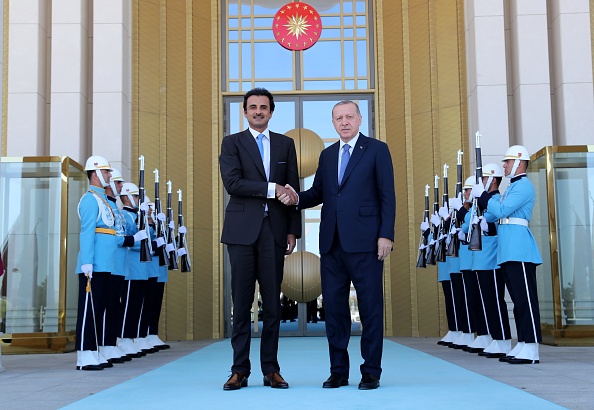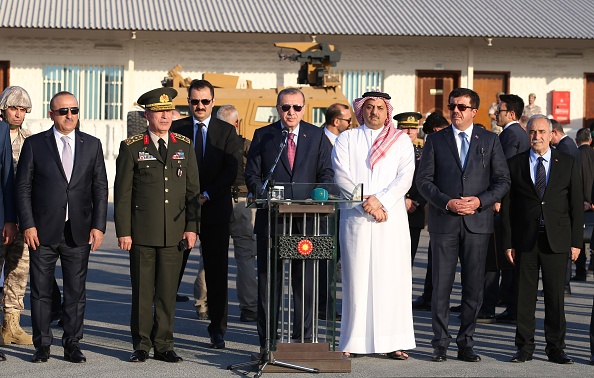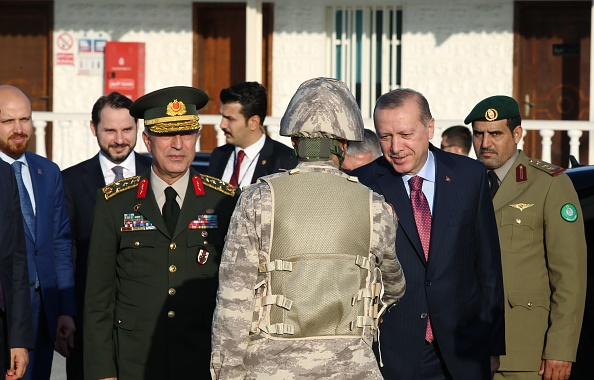If such reports are true, then Qatar would be gaining full military protection from Turkey. Such developments are an extension of Qatar’s role as an “Ottoman mandate”, moreover back in 2017, the Turkish parliament approved of a secret military agreement between both states. While the contents of the agreement are classified, it is widely believed that it gave Turkish military freedom to navigate Qatari soil. Thus, it can safely be said that the Emir of Qatar has given his sovereignty over the country to the Turkish president.
Turkish expansion into Qatar should not come as a surprise given the latter’s fears of the US possibly withdrawing from the Al Udeid Air Base and establishing an alternative base in an another Gulf country. As such, the pendulum that has shifted US interests away from Qatar has forced the Gulf state to act quickly.
Meanwhile, the US has been exerting immense pressure on Qatar’s regional allies, namely Iran. In recent months, Iran has faced unprecedented US sanctions which aims to persuade Tehran to abandon its nuclear weapons program as well as stop its destructive region destabilizing foreign policy. A weakened Iran does not bode well with Doha because the Islamic Republic has historically helped Qatar to circumvent Gulf pressure to stop aiding terrorist groups and interfering in the affairs of other Arab states.
A Washington Institute article on Turkish-Qatari military relations has said that Ankara intends to have a long military presence in Qatar. This comes in accordance with their military agreement which states that if one country is attacked, the other country will help defend it. The article also indicated that a second military base will give Turkey greater strategic influence in the region. For one thing, it can provide Qatar with stronger military training and it can increase its arms sales revenue coming from the Gulf country. Moreover, Turkey will now have a greater naval presence which is necessary considering the rising tensions in the Arabian Gulf, the Indian Ocean, and the Arabian Sea. Turkey will now also be able to fulfill its ambitions of establishing a naval presence in the Indian Sea, something it hasn’t done since the 1650s when the Ottoman Empire battled against the Portuguese Empire for control of that region, the Ottomans would subsequently lose that battle.

TURKISH NATIONALISM AND OTTOMAN NOSTALGIA
Turkey’s current government has expressed its ambitions to go back to its Ottoman past. One narrative that has been floating around among Turkish nationalists is that the chaos and tensions ensuing in the Middle East is due to the fact that countries in the region have been shifting away from Turkish influence ever since the fall of the Ottoman Empire. Therefore, a return of Turkish hegemony in the region would theoretically instill harmony between the countries in the Middle East. It is for this reason that Turkish nationalists believe that Turkey has the right to get involved in the internal affairs of regional neighbors; evidently, such beliefs are based on historic nostalgia rather than real strategic policies.
To increase its influence in the region Turkey has allied itself with various countries which it could easily build bridges with, in this case, Qatar. Turkey exploited Qatar’s foreign policy, which defies that of the rest of the GCC, to establish its first military base in June 2017. Turkey has now set its sights on Iraq and Syria, two countries which were instrumental in Ottoman hegemony in the region. Turkey’s aggression towards said countries should be noted, as its military recently crossed Syrian borders during the 500th anniversary of the Battle of Marj Dabiq.
Speaking of Syria, in January 2018, Turkish President Recep Tayyip Erdogan issued a warning to “those who wish to establish a state in Northern Syria”, stating that doing so would create a “terrorist belt” that would pose a threat to Turkey’s National Pact which its parliament approved back in 1920. Ruling forces in Turkey also stated that the country has the right to decide the destiny of various other states and cities such as Mosul, Aleppo, Kirkuk as well as some regions within Greece and Bulgaria.
Turkey’s relations with Qatar have emboldened the former to commit hawkish acts on various parts of the region, such as Iraq. One Turkish government spokesman claimed that Ankara had the historical right to get involved in Baghdad’s affairs, and various international and bilateral treaties, particularly the 1923 Treaty of Lausanne and the 1926 Treaty of Ankara, gave them such a right.
Turkish officials have falsely tried to claim a long historical relationship with Qatar. For example, Ahmet Davutoğlu, the former Prime Minister of Turkey, has said that his countries relations with Qatar stem back to the Ottoman Era and that both states only recently abandoned their friendship. Moreover, Devlet Bahçeli, chairman of the Nationalist Movement Party, has gone as far as to say that during the Ottoman age, the Qaim Maqam used to rule over Qatar.
Experts in International Law have stated that the secret military agreement is a clear violation of Qatar’s sovereignty as it has been rendered to a vassal state to Turkey rather than an independent Emirate in the Arabian Gulf. Furthermore, Devlet Bahçeli has indicated that the agreement has caused Turkey to make a triumphant military return in the Gulf after almost 100 years of absence in the aftermath of the fall of the Ottoman Empire.
The Swedish news website, Nordic Monitor, recently published some of the clauses contained in the military agreement; among them was one which indicated that Turkish soldiers stationed in Qatar would be immune from Qatari national law. In the event that a Turkish troop commits an unlawful act then he would be tried by a Turkish tribunal under Turkish laws, this is just one example of Turkey violating Qatar’s sovereignty.
The relations between both states go beyond establishing military bases. Doha recently purchased 50 percent of the shares of the Turkish armed vehicle manufacturing company BMC; in turn, the company produced 1500 armed vehicles for the Qatari police and army in 2017. Turkey's ambassador to Qatar, Fikret Ozer, announced in February 2018 that his country would send permanent air and naval forces to Doha once the necessary infrastructure was completed, and a month later the two countries signed an agreement allowing Turkey to establish a naval base in northern Qatar. Strategic experts also traveled to Doha to protect the regime from external threats; even though these developments have permeated Qatar’s sovereignty the regime sees them as advantageous since it has one of the world’s smallest armies.

FINANCIAL ELEMENT OF THE RELATIONS
For Turkey the relationship with Doha will not yield any significant political or military gains, rather this new alliance is seen as an economic opportunity from Ankara’s point of view. Rather Turkey can now alleviate many of its economic shortcomings such as high unemployment, widening trade imbalance, increasing inflation rates, and exacerbating external debt. Turkey now has a vast market in Doha for its military equipment, and Qatar, in turn, will invest in some of Turkey’s defense projects. Turkey is also one of the largest consumers of fossil fuel energy as it spends almost 60 billion dollars annually on oil and natural gas; as such it has now secured its energy needs for the coming years. Turkey is also seeking to build a gas pipeline from Doha to Ankara as part of the Nabucco project, which also aims to deliver Qatari gas to Europe.
Qatar’s Ministry of Commerce and Industry announced that the number of Turkish companies operating in Qatar with Qatari-Turkish capital amounted to about 242 companies; there are about 150 Turkish companies in Qatar operating with 100 percent Turkish capital. The Turkish embassy in Doha valued the investment of Turkish construction companies in Qatar to about 16 billion dollars, moreover, 60 Turkish companies of various sectors operate in Qatar and Doha is also the home to seven thousand Turkish expats working in different fields. The embassy also stated that the volume of direct and indirect Qatari investment in Turkey amounted to 18 billion dollars, which includes investments from companies and institutions and investments from Qatari citizens.

REGIONAL IMPLICATIONS OF A SECOND TURKISH BASE IN QATAR
Turkey’s second military base in Qatar means that both states will not change their foreign policies despite the regional and international pressure they might be facing. Both view their partnership as necessary for achieving their security ambitions and foreign policy which is based on supporting various political and religious groups as well as various terrorist organizations. A recent article published in The Times revealed that the Al-Rayan Bank (a Qatari bank based in the UK), has been financing several Islamist organizations, one of which a charity group classified as a terrorist organization in the United States. Some legal sources have also indicated that a Qatari bank is responsible for transferring funds to Jihadist groups in Syria, and most of the said groups are based in Idlib and they are politically, financially and militarily supported by Turkey.
The continued partnership of both states will have negative impacts on the wider region. The Eritrean government issued an official statement accusing Turkey and Qatar of sabotaging its peace efforts with Ethiopia. Other Arab and African countries have also complained of Turkish-Qatari sabotage efforts, namely Egypt, Libya, and Nigeria.
This bilateral relationship will also have a negative impact on the regional security and stability of the Arab Gulf considering the fact those Turkish forces will now be at close geostrategic proximity to the other Gulf states. The fact that both states also adopt political views that come at odds with the interests of the rest of the Arab Gulf is also a major concern for the rest of the region as a whole.







